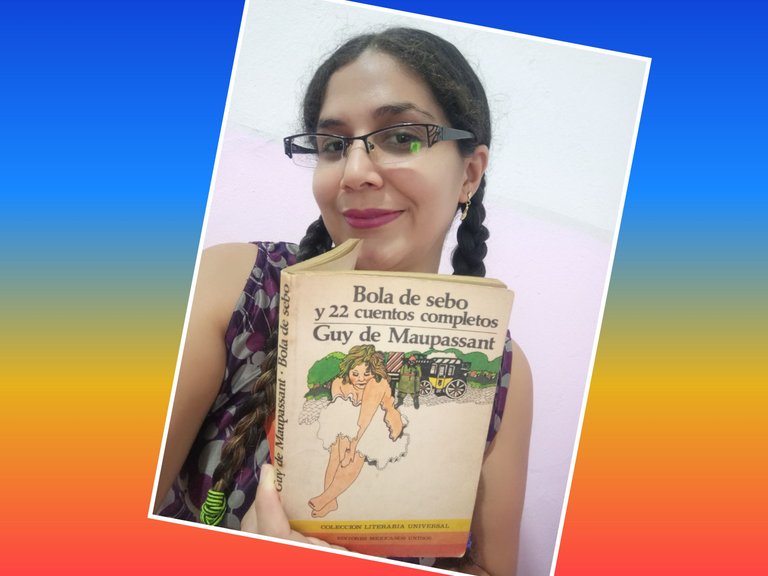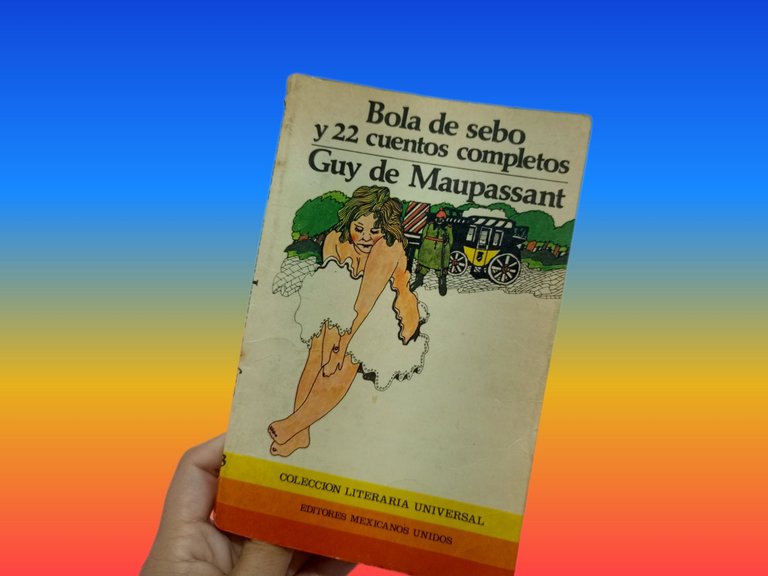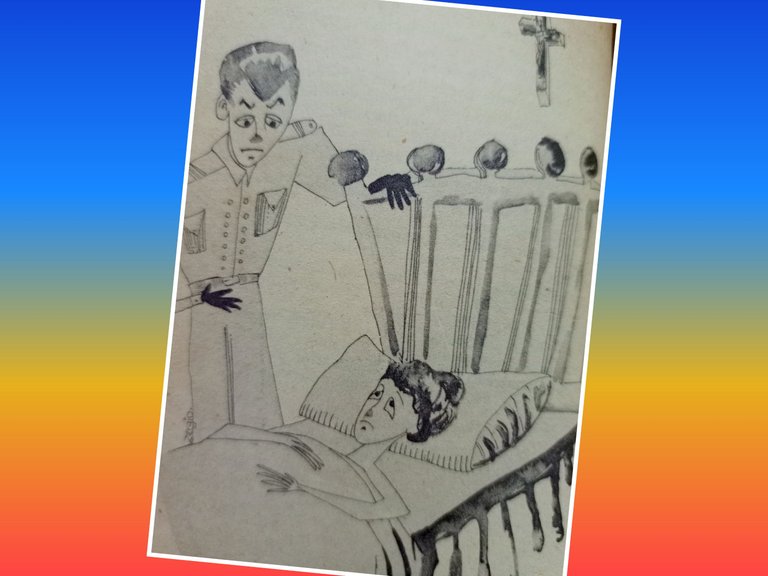Today I will share with you my impressions about the book Tallow ball and 22 complete stories by Guy de Maupassant, French writer of the 19th century. I enjoyed going through these stories since this author is a classic of universal narrative and was characterized by building complex characters and situations full of tension.

I will begin this review with the story The Dowry, here the narrator explores themes such as naivety, greed and disillusionment in love. In these pages we find the character of Juanita Cordier, a naive young woman who marries Simón Lebrumet, a notary who takes advantage of her to steal the inheritance she received from her father.

Maupassant portrays human nature with its different shades, a crude story but full of realism that leads us to a critique of greed, deceit and manipulation. Trust is trampled upon in order to get hold of someone else's fortune without the slightest scruple, which is obviously a criticism of the society of the time.
This story invites us to reflect on the power system, marriage of convenience, prudence and the consequences of being gullible where immoral beings abound. Undoubtedly, Maupassant manages to capture the deep essence of the human being.

The following story is The protector, the narrator introduces us to Juan Marín, a man who managed to become a State Counselor. He touts his position and offers his services to everyone, his life goes by in a monotonous way inside an office. These acts of generosity become the epicenter of the story, from there we can analyze the actions and their respective consequences.
It becomes evident that Juan Marin enjoys the power and influence he can exert, however, life teaches him a lesson for not being cautious and investigating the background of the people he helps. He ends up being a victim of his own vanity by proclaiming himself "The Protector" as his interventions and favors are not discreet. The climax of the story is reached when he meets Father Ceinture, a priest he barely knows and decides to give him his unconditional help, which will have serious repercussions.

Father Ceinture turns out to be an enemy of the government, a conspirator who acts against the established political system. Here the irony is present, as Marín is used as a destructive instrument to attack those who trusted him.
The third story in this selection is Rosita, a tale that raises the game of perception and appearances. The story follows a rich lady who hires a young maid named Rosita, who presents herself as the perfect assistant. Suddenly there is a dramatic twist when the police burst into the house claiming that there is a criminal there.

Rosita is actually a man, a murderer and rapist who escaped from prison. The lady's indignation is palpable, as she not only realizes the risk she took, but also feels humiliated for not being attractive to the criminal.
Maupassant gives us stories where he exposes discouraging realities. His stories do not have happy endings, he appropriates conflictive situations to pose his stories and from there question the morality of his time. We can also notice the presence of the judicial apparatus as a reiterative element, which is presented as incapable and, for this reason, receives constant criticism. We are in the presence of one of the masters of realism in literature and it should be enjoyed in its rightful magnitude.
Versión en EspañolHoy les compartiré mis impresiones sobre el libro Bola de sebo y 22 cuentos completos de Guy de Maupassant, escritor francés del siglo XIX. Me gustó pasarme por estos relatos ya que este autor es un clásico de la narrativa universal y se caracterizó por construir personajes complejos y situaciones llenas de tensión.

Empezaré esta reseña con el cuento La Dote, acá el narrador explora temas como la ingenuidad, la avaricia y la desilusión amorosa. En estas páginas encontramos al personaje de Juanita Cordier, joven ingenua que contrae matrimonio con Simón Lebrumet, un notario que se aprovecha de ella para robarle la herencia que había recibido de su padre.

Maupassant retrata la naturaleza humana con sus diferentes matices, una historia cruda pero cargada de realismo que nos lleva a una crítica sobre la avaricia, el engaño y la manipulación. La confianza es pisoteada para hacerse de una fortuna ajena sin el menor escrúpulo, lo que obviamente es una crítica hacia la sociedad del entonces.
Este relato invita a reflexionar sobre el sistema de poder, el matrimonio por conveniencia, la prudencia y las consecuencias de ser crédulo donde abundan seres inmorales. Sin duda, Maupassant logra captar la esencia profunda del ser humano.

El siguiente relato es El protector, el narrador nos presenta a Juan Marín, un hombre que logró convertirse en consejero de Estado. A todos pregona su cargo y les ofrece sus servicios, su vida transcurre de forma monótona dentro de una oficina. Estos actos de generosidad se convierten en el epicentro de la historia, desde allí se puede analizar sobre las acciones y sus respectivas consecuencias.
Se hace evidente que Juan Marín disfruta del poder y la influencia que puede ejercer, sin embargo, la vida le da una lección por no ser precavido e investigar los antecedentes de las personas a las cuales ayuda. Termina siendo víctima de su propia vanidad al autoproclamarse "El Protector" en tanto sus intervenciones y favores no son discretos. El clímax del relato se alcanza cuando conoce al padre Ceinture, sacerdote al que apenas conoce y decide concederle su ayuda incondicional, lo que terminará con graves repercusiones.

El padre Ceinture resulta ser enemigo del gobierno, un conspirador que actúa en contra del sistema político instaurado. Acá la ironía se hace presente, pues Marín es utilizado como instrumento destructivo para atentar contra quienes confiaron en él.
El tercer cuento de esta selección es Rosita, relato que nos plantea el juego de la percepción y las apariencias. La historia sigue a una señora rica que contrata a una joven doncella llamada Rosita, quien se presenta como la asistente perfecta. De pronto hay un giro dramático cuando la policía irrumpe en aquella casa alegando que hay un criminal allí.

Rosita en realidad es un hombre, un asesino y violador que se fugó de prisión. Se advierte la indignación de la señora, pues no solo cae en cuenta del riesgo que corrió sino que se sentía humillada por no ser atractiva para el malhechor.
Maupassant nos regala historias donde expone realidades desalentadoras. Sus historias no tienen finales felices, se apropia de situaciones conflictivas para plantear sus relatos y desde allí cuestionar la moralidad de su tiempo. También se advierte la presencia del aparato judicial como elemento reiterativo, el cual es presentado como incapaz y, por tal razón, recibe constantes críticas. Estamos en presencia de uno de los maestros del realismo dentro de la literatura y se debe disfrutar en su justa magnitud.
✓Photos from my personal gallery, edited with Fotocollage.
✓Text translated with DeepL.
📚📚📚📚📚📚📚📚📚
✓Fotos de mi galería personal, editadas con Fotocollage.
✓Texto traducido con DeepL.
Posted Using INLEO